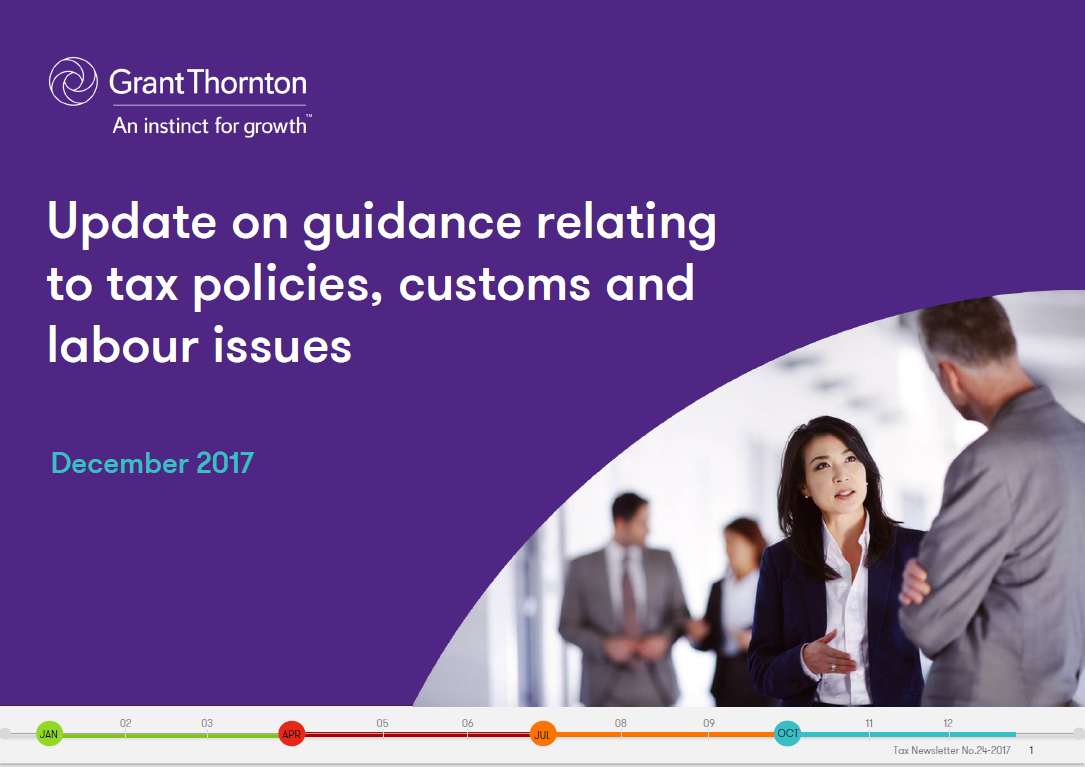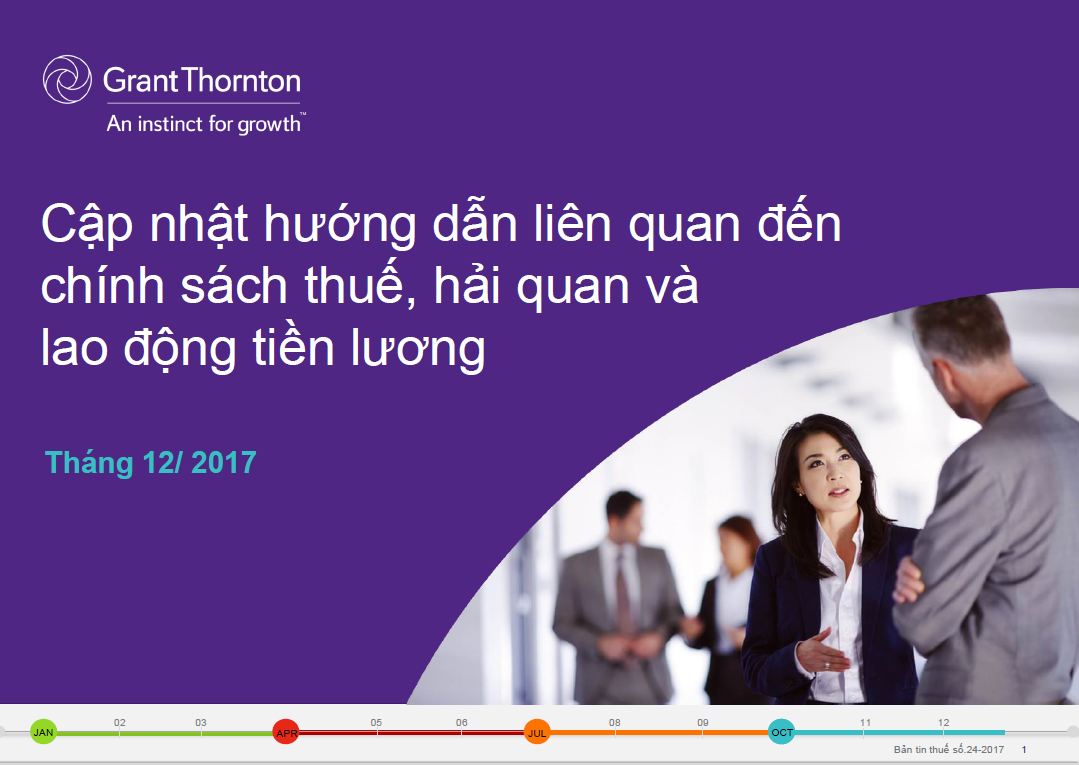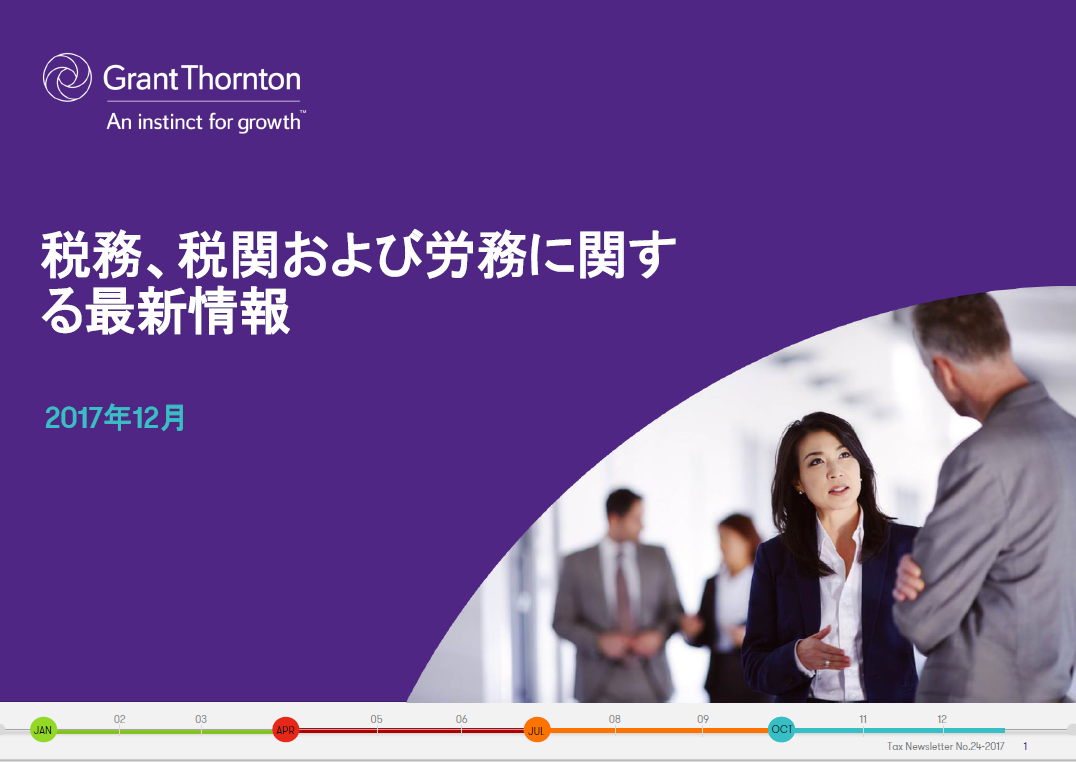-
International Financial Reporting Advisory Services
IFRS reporting advisory serivces of Grant Thornton are carried out by our dedicated team with expertise in IFRS implementation.
-
Audit Services
• Statutory audit • Review of financial statements and financial information • Agreed-upon procedures • FRAS services • Compilation of financial information • Reporting accountant • Cross-border audit • US GAAP audit
-
Audit Quality
We have various methods of monitoring our system of quality control and engagement quality, including real-time involvement of coaches and national office personnel on select audit engagements, reviews of issuer audit engagements prior to archiving by someone outside of the engagement team, and internal inspections of assurance engagements and the system of quality control.
-
Audit Approach
Audit Approach
-
Licensing services
Licensing services
-
International tax planning
Our extensive international network provides us with significant resources to meet all your expansion goals. We strive to develop commercially focused and tailored tax strategies to minimise tax exposures and maximise business efficiency.
-
Expatriate tax planning
We have a broad knowledge base and skills to assist you keep your personal income taxes to a legitimate and reasonable level, while remaining compliant with legislation. We can develop a personalised package for each key employee to take maximum advantage of the exemptions and incentives available.
-
Tax advisory
We will review the proposed business model and transactions and advise on tax implications and recommendations to optimize the tax opportunities under the local regulations and treaties which Vietnam entered into. Furthermore, we coordinate with our GT global tax team to provide a comprehensive tax advisory for the countries involved in the business model and transactions.
-
Tax compliance services
This service is designed to assist enterprises to cope with the statutory tax declaration requirements in line with the Vietnamese tax laws as well as the frequent changes and updates in tax laws.
-
Tax health check
Our Tax Health Check involves a high-level review of specific tax areas to highlight the key issues that need to be rectified in order to reduce tax risks. Through our extensive experience, we have identified key risk areas in which many enterprises are not fully compliant or often overlook potential tax planning opportunities. Our tax health check service represents a cost-effective method to proactively manage risks and reduce potential issues arising as a result of a tax inspection.
-
Transfer Pricing
Transfer pricing is a pervasive tax issue among multinational companies. In Vietnam, the tax authorities require special documentation to report related party transactions. Compliance with transfer pricing regulations is an important aspect of doing business effectively in Vietnam as failure to do so may result in significant penalties.
-
Tax due diligence
We conduct tax due diligence reviews of target companies to analyse their tax exposure and position in relation to acquisitions, mergers or consolidations. We are able to integrate this service with our Advisory Services department in order to offer a comprehensive, holistic due diligence review.
-
Customs and international trade
Our experienced professionals can help you manage customs issues more effectively through valuation planning and making use of available free trade agreements. We also assist Clients in optimising their customs procedures by making use of potential duty exemptions and efficient import-export structures. Risk mitigation activities include customs audit defense and compliance reviews.
-
M&A Transaction
We advise numerous foreign investors on efficient tax structures for their investments. Our experience allows you to consider all the options and set up a corporate structure that meets both operational and tax efficiency requirements. In short, the structure that is best for you.
-
Industrial Zones – Picking A Location For Your Business
Grant Thornton Vietnam’s one-stop services are designed to provide comprehensive support to both new and current investors who are planning to expand or restructure their business in Vietnam. Our professionals have established strong working relationships with landlords, property developers and authorities at various localities. With extensive experiences in liaison with the relevant agencies, we offer assistance including negotiation on land rental rates and efficient management of licensing process. Our customized and flexible solutions can bring benefits of cost efficient location, accelerate licensing process, and optimize tax opportunities while remaining in compliance with legislation.
-
Tax Audit Support
Tax audit support services provide comprehensive assistance to your business in Vietnam. Recent tax practices have shown the general tendency of launching routine tax audit on yearly basis. Tax authorities have been effectively using more sophisticated methods to identify target entities from across different industry sectors.
-
Business Risk Services
Business Risk Services
-
Transaction Advisory Services
Transaction Advisory Services
-
Valuation
Valuation
-
Business consulting services
Finance Management Advisory
-
Accounting services
Accounting services
-
Taxes compliance within outsourcing
Taxes compliance within outsourcing
-
Payroll, personal income tax and labor compliance
Payroll, personal income tax and labor compliance
-
Secondments/Loan staff services
Secondments/Loan staff services
-
Compilation of the financial and non-financial information
Compilation of the financial and non-financial information
-
Accounting systems review and improvement
Accounting systems review and improvement
-
Initial setting-up for accounting and taxes systems
Initial setting-up for accounting and taxes systems
-
Management accounting and analysis
Management accounting and analysis
-
Comprehensive ERP system solution
ERP software is a tool for business operations, production management, order processing and inventory in the business process. Today, ERP software for small and medium businesses has been greatly improved to help businesses manage their business better. The article below will answer all relevant information about what ERP software is and offer the most suitable ERP solution for businesses. Let's follow along!
-
Analyze Business Administration data
We believe in the value that data can bring to the success and development of every business. Our team helps design data architecture supported by tools, to support business governance and provide useful information to management.
-
Financial reporting compliance solution package
Putting financial issues at the heart, this service helps ensure that financial reports for customers comply with both the requirements of Vietnamese accounting regulations and standards (VAS) as well as reporting standards. international finance (IFRS).
-
Third-party ERP extensions
ERP is a long-term solution that requires long-term travel, not short-term. We understand that many businesses cannot deploy the entire ERP system at once due to many different reasons, instead businesses can deploy each part. Over time, these solutions can be expanded to accommodate improved business processes or can even link completely new processes across different departments.
-
Localize, deploy and rebuild the project
Quite a few ERP projects need to be implemented according to current Vietnamese requirements and regulations, but still comply with common international business requirements. These projects need some improvements and adjustments in the right direction.
-
Consulting on technology solutions
We support the selection and implementation of the most suitable solutions, ensuring business efficiency and performance. We will work closely with customers to plan, evaluate and implement the right technology investment strategies and solutions to meet the development needs of businesses.

-
Offshore company establishment service
Using the offshore company model will facilitate the owner in the process of transaction and expand overseas markets, take advantage of the tax policy with many incentives and protect the value of the family enterprise's assets.
-
Private Trust Advisory
The development of the economy with many modern financial instruments has brought many advantages and opportunities for the enterprises, but there are still certain potential risks in any type of business. So how to protect your asset value with an appropriate company structure while stay compliance with relevant regulations?
-
Our values
We have six CLEARR values that underpin our culture and are embedded in everything we do.
-
Learning & development
At Grant Thornton we believe learning and development opportunities help to unlock your potential for growth, allowing you to be at your best every day. And when you are at your best, we are the best at serving our clients
-
Global talent mobility
One of the biggest attractions of a career with Grant Thornton is the opportunity to work on cross-border projects all over the world.
-
Diversity
Diversity helps us meet the demands of a changing world. We value the fact that our people come from all walks of life and that this diversity of experience and perspective makes our organisation stronger as a result.
-
Contact us
Contact us
-
Available positions
Experienced hires
-
Available positions
Available positions
1. Preferential export-import tariff schedule and changes in the automobile import duty
On 16 November 2017, the Government issued Decree No. 125/2017/ND-CP amending and supplementing Decree No. 122/2016/ND-CP on the export tariff schedule, the preferential import tariff schedule, the list of commodities and their flat tax, compound tariff and out-of-quota import tariff. Some notable points include:
- The list of preferential import tariffs under Decree 125 increased by 1,255 tariff lines compared to the list attached to Decree 122.
- Preferential import duty rate of 0% for imported car parts applies effective from 16 November 2017 to 31 December 2022. The applicable conditions include:
- Enterprises must commit to produce and assemble automobiles meeting the emission standard of level 4 (from 2018 to 2021) and level 5 (from 2022 onwards).
- Enterprises must commit to produce and assemble automobiles meeting the regulatory requirement of output quantity and specific models.
- The imported components must be in the regulatory group of products which cannot be produced domestically and meets the requirements of degree of completeness.
With regard to the procedures for implementation of the preferential import duty rate of 0%, at the time of import, enterprises still have to declare and pay duty at the normal import duty rates (or incentives, if any), without applying the preferential rate of 0%. Enterprises then submit application dossier to request for application of duty rate of 0% every six months (60 days from 30 June or 31 December each year at the latest) for the customs authority to conduct inspection and handling. If satisfying the conditions of the preferential import duty program, the enterprise shall be allowed to claim the overpaid import duty amounts in accordance with the regulations.
- The import duty rates on used passenger cars under 16 seats will increasewhilst those for used passenger cars with 16 seats or more and trucks remain unchanged.
The new decree is an effort of the Government to promote the development of the domestic automobile manufacturing industry and the sustainable growth of the economy. Additionally, the Decree also aims to reduce the number of used cars imported into Vietnam, thereby improving the consumption of domestically produced cars as well as reducing the environmental pollution from older vehicles.
The Decree is effective from 01 January 2018. However, the preferential import duty rates applicable to imported automobile components shall come into force from the promulgation date of the decree (16 November 2017) to 31 December 2022.
2. Regulation on information exchange and coordination between Customs authorities and Tax authorities
The Ministry of Finance issued Decision No. 2413/QD-BTC dated 23 November 2017 promulgating regulations on the exchange of information and work coordination between Customs authorities and Tax authorities. Accordingly, the noteworthy points are as follows:
The provision and exchange of information
- The Decision indicates the List of information and documents which the Customs authorities and Tax authorities can exchange and provide for (according to the Appendix issued together with the Decision)
- Decision on the formality, mechanism of exchange and provision of information at each level includes three main forms:
- Automatic data transmission: connecting and periodically transmitting large amounts of data between two systems.
- Data query: online data mining via web service or search application on each others database on the basis of the connection between two systems.
- Direct communication between the two offices.
- The exchange of information between the Customs authorities and the Tax authorities shall be made through the focal point units prescribed at each level.
The collaboration on implementation of risk management
The Customs authorities and the Tax authorities will jointly and uniformly formulate and implement the criteria for assessing the compliance of enterprises and rating enterprises’ risk levels in customs and tax administration, thereby evaluating and rating the import – export businesses, identifying the prioritised enterprises and high-risk enterprises to apply appropriate customs and tax management measures.
The coordination between customs management measures and tax management measures
The Customs authorities and the Tax authorities shall coordinate to fight against fraud in Value Added Tax (“VAT”) refund through the development and application of risk assessment criteria in VAT refund. Additionally, the two offices will cooperate in inspecting, verifying and handling cases of violation of customs laws and tax laws.
When settling VAT refunds for enterprises, the tax authorities shall automatically offset the refundable amount against the tax payable amount, late payment interest and fines relating to imported/exported goods which enterprises owe the customs authorities on the basis of data exchange between the two authorities or the retrieval of tax debt information on the customs website.
3. Loan interest expenses incurred by enterprises having related party transactions
Binh Duong Tax Department issued Official Letter No. 19676/CT-TTHT dated 24 November 2017 providing guidance on interest expenses for enterprises having related party transactions. Accordingly, in case enterprises subject to Decree 20/2017/ND-CP incurred related party transaction during the year, the total interest expense arising in the period will be deductible for Corporate Income Tax (“CIT”) purpose provided it does not exceed 20% of the total net profit from business activities plus the interest expenses and depreciation and amortization expenses.
However, the guideline does not mention whether the said total interest expense includes or excludes the interest expenses from non-related parties. In addition, the Official Letter does not clarify whether this provision shall apply to enterprises not subject to Decree 20/2017/ND-CP. Therefore, enterprises should carefully consider the CIT deductibility of interest expenses (if any) in each specific case in line with Decree 20 and refer to the guidance of local tax authorities before actual implementation.
4. Value Added Tax (“VAT”) on interest from overdue payments relating to the economic contracts
On 9 October 2017, Hanoi Tax Department issued Official Letter No. 66392/CT-TTHT guiding the VAT treatment on interest from overdue payments relating to economic contracts. When e businesses receive interest from overdue payments due to their partners' failure to make payment on time, in accordance with the contractual terms, the interest received will be neither declared nor subject to VAT. Enterprises only need to compile the collection vouchers and recognise revenues to determine taxable income in compliance with CIT regulations.
5. Tax policy on imported goods for manufacture of exported goods
The General Department of Customs issued Official Letter No. 7817/TCHQ-TXNK dated 29 November 2017 addressed to provincial departments of customs to provide guidelines on imposition of tax on goods imported for the manufacture of exported goods. Accordingly, when enterprises import raw materials, supplies and components (“materials”) for manufacture of exported goods, then transfer these materials to their dependent branches for manufacturing, and later receive the goods back to continue the manufacture and export of the finished products; the transferred materials shall be exempt from import duties as regulated.
6. Report on the 2017 salary payment status and bonus plan for 2018 Tet holiday in Ho Chi Minh City
On 28 November 2017, the Ho Chi Minh City Department of Labour, Invalids and Social Affairs (“HCMC DOLISA”) issued Official Letter No. 30768/SLDTBXH-LD on creation and public announcement of the plan on 2017 salary payment and 2018 Tet holiday bonus as well as reporting adequate information of salary and bonus. Accordingly, businesses in Ho Chi Minh City are required to complete the Report on 2017 salary payment status and the Bonus plan for 2018 Solar New Year and Lunar New Year (attached to the Official Letter) and submit by 16 December 2017 to the Office of Labour, Salary and Social Insurance, HCMC DOLISA; or the Office of Labour Management, Ho Chi Minh City Export Processing and Industrial Zones Authority (“HEPZA”) or the Office of Enterprises, Management Board of the Saigon Hi-Tech Park (“SHTP”).
Please contact our professional advisors at Grant Thornton Vietnam should you need our assistance with taxation, work permit for expatriates and legal issues during the course of your business.






